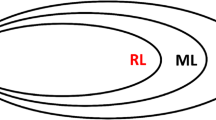Abstract
In this paper, a novel algorithm based machine learning technique for control nonlinear coupled tanks system is presented. An intelligent controller using adaptive neuro-fuzzy inference system (ANFIS) based reinforcement learning is proposed (ANFIS-RL) by representing the nonlinear coupled tanks system as a Markov decision process. A model-free learning algorithm has been used to train a policy that controls the liquid level of the tanks system without the need to determine the dynamic model of the controlled system. Based on the optimal learned policy, which is approximated by ANFIS, the controlled system can perform the best action quickly based on the states of the system. Simulation results demonstrated the feasibility of the proposed algorithm.










Similar content being viewed by others
Abbreviations
- ANFIS:
-
Adaptive Neuro-Fuzzy Inference System
- RL:
-
Reinforcement Learning
- MDP:
-
Markov decision process
- MPC:
-
Model Predictive Control
- IAE:
-
Integral Absolute Error
- ITAE:
-
Integral Time Absolute Error
- \(L_{i}\) :
-
Liquid level of tank i
- \(S_{i}\) :
-
Cross-section area of tank i
- \(s_{i}\) :
-
Outflow orifice at the bottom of tank i
- \(g\) :
-
The gravitational acceleration
- \(f\left( t \right)\) :
-
Inflow rate
- \(k_{p}\) :
-
Pump constant
- \(u\left( t \right)\) :
-
The voltage applied to the pump.
- \(O_{1,i}\) :
-
Membership function of fuzzification layer
- \(O_{2,i}\) :
-
Function of product layer
- \(O_{3,i}\) :
-
Normalization layer function
- \(O_{4,i}\) :
-
Defuzzification layer function
- \(p_{i}\) :
-
Consequent parameter
- \(q_{i}\) :
-
Consequent parameter
- \(r_{i}\) :
-
Consequent parameter
- \(O_{5,i}\) :
-
Output layer function
- S :
-
The environment states
- r :
-
The reward value
- a :
-
The policy
- \(R_{t}\) :
-
Accumulated reward
- \(\gamma\) :
-
Discount factor
- S :
-
States set
- U :
-
Actions set
- R :
-
Reward function
- F :
-
State transition function
- \(V^{\pi } \left( s \right)\) :
-
The value function
- \(\pi^{*}\) :
-
Best policy
- \(V^{*} \left( s \right)\) :
-
Optimal value function
- \(\beta\) :
-
Positive real number
References
Başçi A, Derdiyok A (2016) Implementation of an adaptive fuzzy compensator for coupled tank liquid level control system. Measurement 91:12–18
Gouta H, Said SH, Barhoumi N, M’Sahli F (2015) Observer-based backstepping controller for a state-coupled two-tank system. IETE J Res 61(3):259–268
Biswas PP, Srivastava R, Ray S, Samanta AN (2009) Sliding mode control of quadruple tank process. Mechatronics 19(4):548–561
Hamoudi AK (2017) Design an Integral Sliding Mode Controller for a Nonlinear System. Al-Khwarizmi Eng J 13(1):138–147
Kara T, Mary AH (2018) Robust trajectory tracking control of robotic manipulators based on model-free PID-SMC approach. J Eng Res 6(3):170–188
Mary AH, Kara T (2016) Robust proportional control for trajectory tracking of a nonlinear robotic manipulator: LMI optimization approach. Arab J Sci Eng 41(12):5027–5036
Xu J, Li C, He X, Huang T (2016) Recurrent neural network for solving model predictive control problem in application of four-tank benchmark. Neurocomputing 19(190):172–178
Mrugalski M, Luzar M, Pazera M, Witczak M, Aubrun C (2016) Neural network-based robust actuator fault diagnosis for a non-linear multi-tank system. ISA Trans 61:318–328
Patel HR, Shah VA (2019) Passive fault tolerant control system using feed-forward neural network for two-tank interacting conical level control system against partial actuator failures and disturbances. IFAC-PapersOnLine 52(14):141–146
Jegatheesh A, Kumar CA (2020) Novel fuzzy fractional order PID controller for non linear interacting coupled spherical tank system for level process. Microprocess Microsyst 72:102948
Boubakir A, Boudjema F, Labiod S (2009) A neuro-fuzzy-sliding mode controller using nonlinear sliding surface applied to the coupled tanks system. Int J Autom Comput 6(1):72–80
Li F, Jiang Q, Zhang S, Wei M, Song R (2019) Robot skill acquisition in assembly process using deep reinforcement learning. Neurocomputing 345:92–102
García J, Shafie D (2020) Teaching a humanoid robot to walk faster through Safe Reinforcement Learning. Eng Appl Artif Intell 88:103360
Shipman WJ, Coetzee LC (2019) Reinforcement learning and deep neural networks for PI controller tuning. IFAC-PapersOnLine 52(14):111–116
Haznedar B, Kalinli A (2018) Training ANFIS structure using simulated annealing algorithm for dynamic systems identification. Neurocomputing 302:66–74
Wu YH, Yu ZC, Li CY, He MJ, Hua B, Chen ZM (2020) Reinforcement learning in dual-arm trajectory planning for a free-floating space robot. Aerosp Sci Technol 98:105657
Pane YP, Nageshrao SP, Kober J, Babuška R (2019) Reinforcement learning based compensation methods for robot manipulators. Eng Appl Artif Intell 78:236–247
Johannes D, Norbert L, Peter G (2020) Model-free adaptive optimal control of episodic fixed-horizon manufacturing processes using reinforcement learning. Int J Control Autom Syst 18(1):1–12
Author information
Authors and Affiliations
Corresponding author
Additional information
Publisher's Note
Springer Nature remains neutral with regard to jurisdictional claims in published maps and institutional affiliations.
Rights and permissions
About this article
Cite this article
Mary, A.H., Miry, A.H. & Miry, M.H. ANFIS Based Reinforcement Learning Strategy for Control A Nonlinear Coupled Tanks System. J. Electr. Eng. Technol. 17, 1921–1929 (2022). https://doi.org/10.1007/s42835-021-00753-1
Received:
Revised:
Accepted:
Published:
Issue Date:
DOI: https://doi.org/10.1007/s42835-021-00753-1




